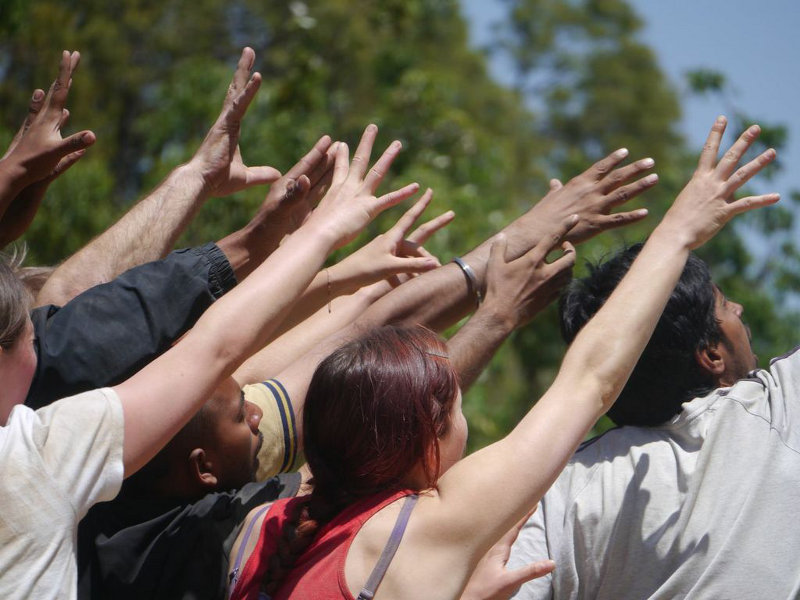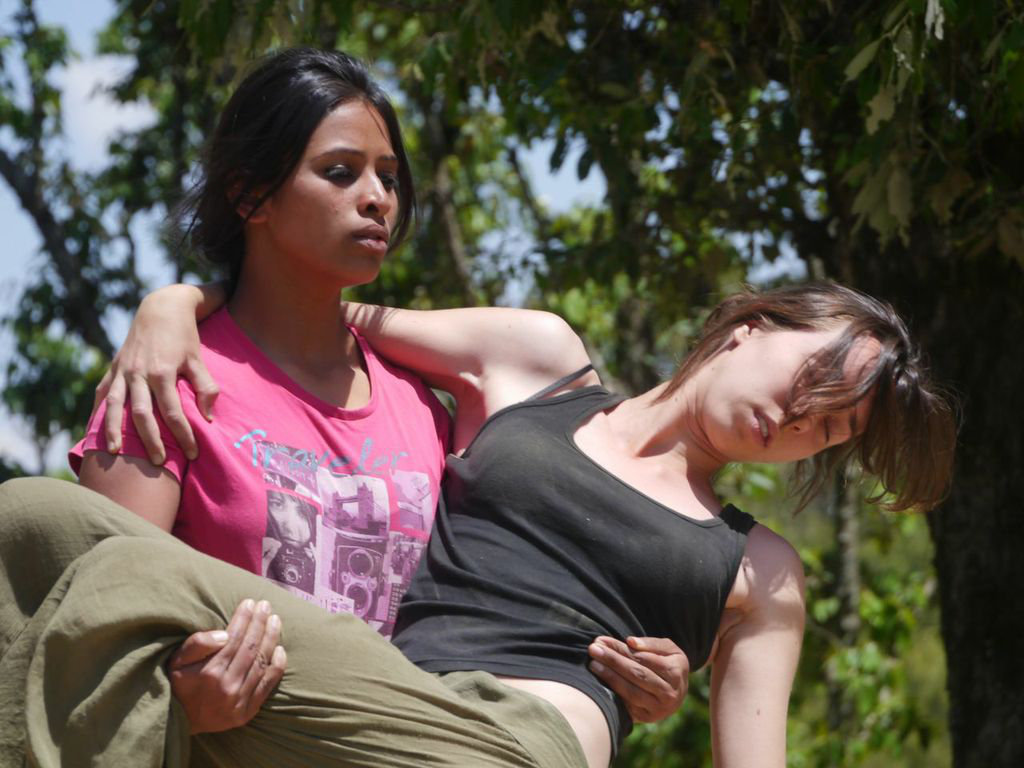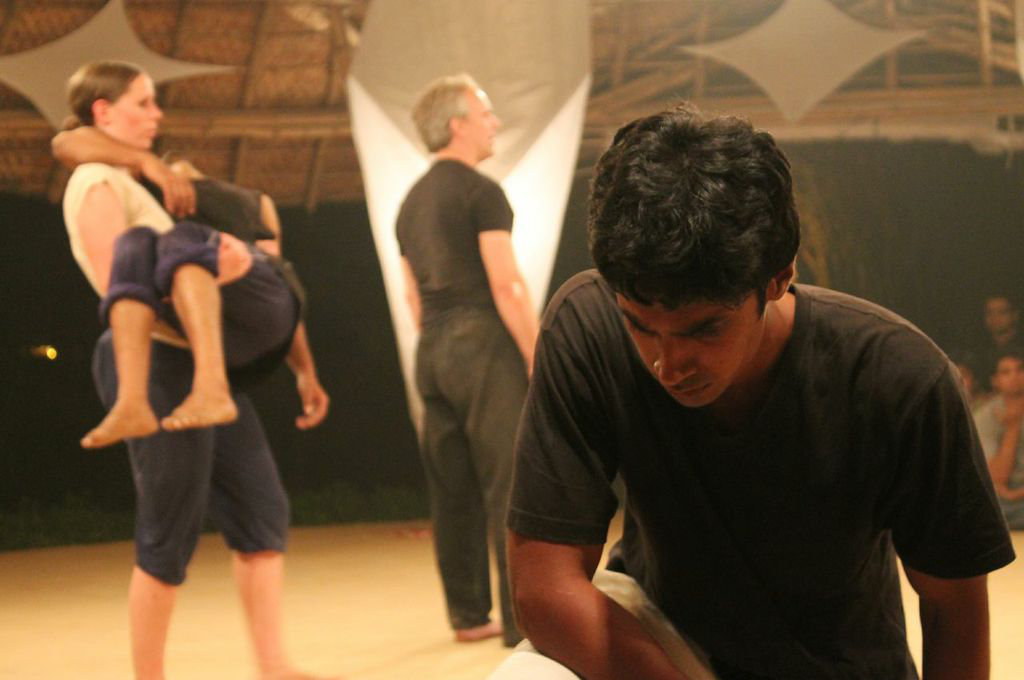When Stanislavski and Nemirovich-Danchenko set up the Moscow Art Theatre – intending to rescue Russian theatre from commercialised, celebrity-obsessed mediocrity – one of their first acts was to leave Moscow and take their new ensemble on a rural retreat. Away from the routines of daily life, they sought to create a new theatre.
A few years later, and on the other side of Europe, Jacques Copeau, disgusted by the theatrical culture that surrounded him, took his young company from Paris to rural Provence. There he intended to revolutionise French theatre and develop new languages of performance for new audiences.
In the century since then, the rural retreat – sometimes temporary, sometimes permanent – has been a recurring feature of theatrical practice, especially for artists interested in ensemble.
In 2008, as part of my work training and rehearsing ensembles, I began to run residential workshops. For between two and fourteen days, a small group of performers gather in a rural location to train, share living space, talk and learn to be alone together. During longer residencies, we sometimes create a performance to be shared with the wider world.
In 2012 I received an invitation from Arka Mukhopadhyay of The Arshinagar Project to visit India, to perform and to run short workshops and residential workshops. A little over a year later, fresh from a week-long residency in rural Tamil Nadu and a four-day workshop at the Gati Dance Forum in Delhi, I started Macbeth in the Mountains, a two-week residential workshop in a valley in the foothills of the Himalayas.
We arrived in the valley in the middle of the afternoon. We were not all of us in the best condition. I was recovering from food poisoning. A few were struggling with motion sickness, triggered by the four-hour, winding, vertiginous drive up the mountain. All of us were tired. The previous day we had travelled by train from Delhi and, after an overnight stay at the railhead and that journey up the mountain, we had discovered that reaching the valley meant a forty-five minute trek through the forest, carrying rucksacks and following ponies laden with supplies.
Yet our first reaction on arriving was awe. We were in a truly beautiful place. It was to be our home, our studio, our training space, for two weeks. Here, in this valley, our group of twelve would live, train, create. There were six Indian performers, four international performers, Elina Elestrand (a Swedish dancer/choreographer) and me. We would meet each other, train, explore Shakespeare’s Macbeth, and together make a performance to be shown in the valley and then in Delhi.
After my first reaction, there came a second one. ‘WHAT ARE WE DOING HERE?’
Though the idea of the residency was exciting, and the location extraordinary, the reality was clearly going to be tough. Much tougher than I, or any of the others, had imagined. The tarpaulin-covered space was not big enough for twelve of us to work physically without risking injury. There was nowhere to work if it rained. There was only a mountain stream to wash in, a spring to drink from. Information about allergies had been inaccurately conveyed and the local cook looked incredulous at the thought of two weeks of no chili, no wheat, no soya. The slopes of the valley – to be negotiated each time you needed to move from one spot to another – were thigh-achingly steep. There was not enough voltage in the sporadic power supply to power speakers. So no music. My tentative concept for the performance and Elina’s plans for two weeks of dance classes evaporated.
Did the valley’s magical beauty and the fact we were committed to our work justify the enormous effort that getting there had cost and that making work there would entail? What was the point of our leaving all that was familiar to embark on a creative and training journey in the middle of what felt like the edge-of-the-end-of-the-earth?
The first, most obvious point of a residency is that it forces us to ask that very question: ‘Why are we here?’ What makes our art worth doing? Standing amid the dust of the valley, a soft wind blowing, a cow wandering past, a farmer kneeling and hand-weeding her field, I wondered whether what I do is worth its doing? Hearing some lines of Macbeth, I knew the world would not end if another production inspired by Shakespeare did not happen. Yet, we made it happen. We warmed up. We started the training exercises. We improvised. We developed performance material. We reflected on our work.
We make art because that is what artists do. Art is only important if, first, the artist makes it important. If it is not important to the artist, how and why should it become important to the rest of the world? We made a commitment to travel to a remote valley, and that commitment was a commitment to our work as artists. That is important. We discover whether we can make our work important when the process of daily living is challenging, tough and confronting.
Part of the process of (re)learning to value our work involves understanding how to put our work into the world we live in – even if we are only living there for a week or two. I encouraged people not to be intimidated by the valley, nor to try to dominate it. We needed to learn to allow our work easefully to inhabit the valley – whether we were training, improvising, singing or rehearsing performance material. We needed, as artists, to inhabit our environment with the same confidence and humility as the farmer, the cow, the wind. The unmediated contact with the detail of our environment helped put our work in perspective and encouraged each of us to confront the basic question of our own motivation – why do we think that what we do is worth doing?
If we can find how our work can inhabit a Himalayan valley – wrapped in a continuous wind and with vistas of a hundred miles or more dwarfing the rehearsal space – then inhabiting a theatre might seem just a little less daunting.
Another effect of the shift from familiar daily life to an unfamiliar environment is that it lets us experience ourselves, our work, each other and our world afresh. We hear with fresh ears, see with fresh eyes, touch with newly sensitive skin. In leaving behind habitual daily patterns, we can drop our usual ways of ‘being in the world’. We become more sensitive to ourselves, each other and the world we live in.
As we explored the scene when King Duncan first arrives at Macbeth’s castle, there was birdsong from the forest behind us and a single black bird flew overhead. Suddenly the imagery of Shakespeare’s text became the texture of the valley we worked in. The text, the physical languages, the interconnectedness of the ensemble, became thrillingly alive. Our actions, our imaginations and our environment merged.
As Elina first staged a sequence evoking the storm that follows Duncan’s murder, thunder swirled round the rim of the valley and the sky turned dark grey. We ran to shelter. There was torrential rain and later a lightning storm that delighted, excited and terrified us. The power went off. Night fell. The inescapable nature of the residency meant that these were experiences we shared, were collectively thrilled by, reflected on together and (for those less fond of a violent mountain storm) helped one another through.
This is another essential element of the rural residency. We learn how to live together. The behaviours and ethics of the community grow alongside the creative work of the ensemble. The ways we choose to live together become intricately linked to the relationships we develop inside the creative work. What one person finds tough, another finds easy. We learn that everyone has their own struggle. We learn to accommodate ourselves to one another. We learn to rely on our own initiative.
Removing ourselves from daily life allows us to reinvent ourselves. We learn to explore how to be in relationship to one another, something that is sometimes harder in the outside world, where we are ‘known’, where there are expectations placed on us (by ourselves and by others). The ethics of the performance ensemble intersect with the ethics of community. There is generosity and compromise. There is also a need for understanding and respect when someone cannot compromise, when an individual’s needs simply must be accommodated. The development of ensemble requires deep respect for individuality. Compromise – though crucial – does not create great art. We learn instead to negotiate. The pressure-cooker nature of a remote residency makes this negotiation significant. We all live with the consequences of our choices.
Ultimately, though hard, our two-week stay in the valley was rich and surprisingly painless. There were negotiations between different cultural perspectives and expectations, based on ethnicity, different trainings and gender. The individual journeys we each travelled were, at times, overwhelming. There was laughter, delight, moments of ecstasy, deep personal and inter-personal revelation, misunderstandings, profound conversation, utter solitude, freezing baths under the burning midday sun, aching muscles, more laughter, and a sense of profoundly being alive and being engaged in the process of making art. A diverse group of twelve became a complex performance ensemble. For two weeks we were artists. Full-time.
At the end of the process we performed in the valley to the farmers who scraped their living there. They spoke no English nor had they heard of Shakespeare. But they watched and laughed and joked with those of the ensemble who spoke a language they could communicate in. Afterwards we all shared food.
Later, back in Delhi, we performed again, in a covered outdoor space on a rural campus on the edge of the city. As the performance ended, the large crowd utterly silent, the performers slowly left the space and stood looking back at the audience from the darkness beyond. From a nearby pond came the croaking of a frog. I heard the world, vibrantly alive around me and knew that what we had just performed was part of our world’s passing texture. Like the wind. Like a frog. Like lightning. Our art matters as much, and as little, as everything else.
When we left the valley, its details, inevitably, began to fade. But the power of the rural retreat is found in the changes it provokes in those who undertake it. We brought the valley with us when we left. We were more alive, more detailed, more connected to ourselves, to each other and to the world than we had been when we arrived. The ensemble that formed in the valley – the detail of the work and the ways of being with each other we learned – survived in Delhi. The experience continues to echo in the work of those who came to the residency, now we are dispersed back to our daily realities.
Currently (summer 2013) I am on the way to Lesvos to run another residency. Under the olive trees, on the beach and in the sea, we will explore ‘Performing at the Edge’. It sounds idyllic and – having been there last year – I know it is. But it is not a holiday. It is deep, intense and challenging work. We will all leave changed.
This perhaps is why rural retreats endure. They reinvigorate the participant, allowing us to step back from the noise of daily life and ask ourselves and others the most basic of questions: ‘Why do I do this?’
Macbeth in the Mountains ran from 6–20 April 2013, with a performance in Delhi 23 April 2013.
Forthcoming Duende workshop dates for Autumn 2013:
31 August – 6 September: Residential Workshop at Au Brana Cultural Centre, France
14 –15 September: London workshop (venue tbc, see website for booking details)
11–13 October: Kontakt Club, Thessaloniki
18–22 October: Chania & Heraklion, Crete
25–27 October: Klinik Klowns, Vienna, Austria
28–29 October: ‘Psychophysical Performance as Mindfulness Practice’ University of Huddersfield, UK
Further September/October dates tbc in Los Angeles, San Francisco & California




